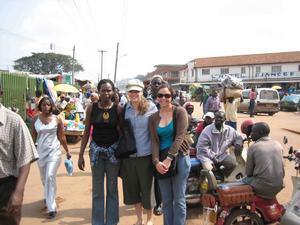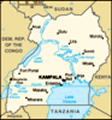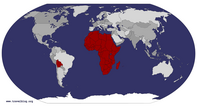Advertisement
Published: August 8th 2006

 Outside Owino Market
Outside Owino Market
This is a picture of Molly, Alli and Alex outside of Owino market about to brave the crowds and do some shopping. About three weeks ago some young college students asked if I would classify Uganda as a peach or coconut. At least I think those are the two fruits used in the metaphor but regardless of whether my memory serves me you can get the general idea. The metaphor being that a country is either a peach or coconut, now I realize this is stereotyping and it’s all much more complicated than that, but nonetheless there is some truth to it. It was explained it to me like this- Japan would be a coconut, it’s hard to get into the society to break through (pun intended), but once in you are tight and the bonds are very close. Uganda is a peach, soft on the outside easy to get in superficially but then you hit the seed, it’s much more difficult to penetrate the hard center.
My experience with Ugandans is that they are very warm and open, happy to talk and provide assistance etc… Not to say that there are not some bad seeds because everywhere and anywhere you travel there are plenty. For example, the taxi drivers who don’t even try to rip you off reasonably, of course

 Owino Market
Owino Market
This is a picture of me, Alex and Molly inside Owino market, taking a break from sifting through the piles of clothes for hidden treasures. I know there is a muzungu tax, but at least quote me a price that is reasonable. I mean it doesn’t take long to learn what prices are laughable and what prices are decent enough so that I am not going to argue the extra twenty to thirty cents they are over charging. I have encountered the token individuals who think it’s perfectly acceptable to stare at you as if you have a third arm growing out of your forehead. I mean I am not the only muzungu* they have ever seen, it gets annoying and if you say something like “What are you staring at?” or what you feel like saying “What the hell are you looking at! Have you never seen a muzungu before!”, then I worry about being considered rude and giving a bad name to muzungus. How you react to these individuals is difficult a constant lesson in patience and tolerance because I am a guest in their country. Now these are benign examples, of course the taxi guys are just trying to make a buck and maybe I do have something on my face when people stare? The thieves, murderers, rebels and corrupt officials are the honest to goodness bad seeds, but I just have not personally met any of them (at least not to my knowledge).
This past Saturday Alli, Alex and I went with Molly (Ugandan) to the Owino market. There you can buy about anything you want, where people yell and grab and yell some more as your maneuver the crowded aisles between stalls and piles of used clothes and other knick-knacks. We managed the insanity pretty well considering it had rained the day before and was extremely muddy adding an extra obstacle to the pushy and impatient crowd in every aisle. Plus being three white girls in the market, everyone is trying to get you to stop at their pile or stall to shop. Luckily Molly was with us and could bargain and keep us from getting completely lost and overwhelmed. We finally found a section where we could stand and sort through piles of second hand clothes sent from the states, this particular section was relatively calm and no one harassed us too much as we sifted.
However walking between sections was an entirely different story and we did not bite our tongues as the day wore on and our patience wore out. People were grabbing our butts, as if that is a completely acceptable way to get my attention. “Oh I am sorry I was going to pass by your stall filled with acid washed jeans but since you’ve grabbed my ass let me stop and buy some from you”, seriously, I cannot think of anytime where that would be either appropriate or effective, but many vendors did it. After about an hour of being grabbed and harassed while walking each of us hit our threshold at a separate moment. For me it was when some guy reached out and grabbed my arm, hard. He didn’t just touch me as I passed to get my attention but grabbed my wrist hard, and pulled me towards him. I hauled off and hit his arm and cussed him to not grab me like that. Afterwards I felt mixed emotions, I felt justified I mean it’s not right to forcibly grab strangers for no necessary reason (if someone can provide an alternative example I will gladly retract that last statement). But at the same time I felt guilty, I mean I am a guest in this country, I am giving a bad impression of muzungus which is only going to color this persons interaction with the next muzungu. So my point is that Uganda is a peach, the great percentage of people I have met have been nice and kind but like in any society it has it’s share of bad seeds.
Which brings me to something else which colors daily life here, whether it’s blatantly in your face or just hovering below the surface, the legitimate bad seeds that plague Uganda’s history and created the humanitarian crisis in the north for the past twenty years. Ugandans suffered under the dictatorships of Idi Amin and Milton Obote, when during the 1970s and early 1980s approximately half a million people were killed in state sponsored violence. Joseph Kony’s Lord’s Resistance Army (LRA) has been terrorizing the Acholi people of Northern Uganda for the past twenty years. As a result over a million people have been displaced and are living in IDP camps in the north, there is no exact count of the number of people who have died but estimates are in the tens or thousands. It was nearly impossible to find a Ugandan whose family has not been directly affected by one of both of these crises. I would do a great injustice to describing the associated histories as I am still learning and trying to understand, therefore if you are interested I will leave you to your own devices to do some research.
Currently the Sudan is in the process of brokering peace talks between the Government of Uganda and the LRA, many Ugandans express district in these talks and are apprehensive although they express desires to be optimistic of the possible outcomes. The LRA’s tactics are brutal to say the least murder entire families and villages, abduct the children and often force these children to murder their own families or friends as an initiation into the ranks of the LRA.
Prior to coming to Uganda I did my research on the northern conflict, the LRA, child soldiers etc… but all the reading doesn’t hold a candle to meeting someone who has experienced it firsthand. As I have written in a previous entry I am house-sitting for an American family. Their nanny who I’ll call Mary is a twenty-nine year old Acholi from Gulu and has on the best and most positive perspectives on life of anyone I have ever met, especially considering everything she has endured. A few Sundays ago she came to the house to visit and brought a DVD. It was a short documentary film shot by a Ugandan documentary filmmaker and based on actual events. It follows a young boy, Okello, who the LRA abducts along with his brother and schoolmates. The documentary was very upsetting even though it did not depict anything I had not read. While watching the video together we learned Mary’s story and how the LRA abducted her twice. During her abduction and time with the LRA she raped so brutally she can never have children. While with the LRA she said she never actually spoke to Kony but saw him on a few occasions. She was also forced to become a wife to one of the generals. She has been through more in her life than any one person should ever have to endure but her positive attitude, optimistic outlook and sheer strength are humbling. The fact that as a young girl after being abducted, witnessing her family being murdered and enduring multiple rapes she still had the wherewithal to escape is beyond my comprehension. The first time she escaped with the assistance of an older child, but the second time she escaped by herself. I am not explaining this to manipulate your feelings or exploit Mary’s personal story, but it is an example of the sheer strength of character demonstrated by Ugandans in general. Another short example is of the guard who comes every night from seven o’clock pm until seven o’clock am, who Alli ad I have chatted with on multiple occasions but only discovered a few days ago he too is an Acholi and his niece was killed in the northern conflict, but she was not murdered by the LRA but by the Ugandan national army, not the side of the story you are likely to read about in any newspaper.
Most people have been directly affected but you do not get the feeling that everyone feels sorry for himself or herself and takes pity on their personal situation, quite the opposite. There are plenty of other issues affecting Uganda whether political, economic, or related to public health but all of these work in tandem to create a very complex and confusing, beautiful and warm country. A country about which I am continually learning and of which I will only scratch the surface of the seed as I try and make sense of everything I learn about and encounter through the people I meet while here.
*translates as white person
Advertisement
Tot: 0.125s; Tpl: 0.01s; cc: 10; qc: 62; dbt: 0.0803s; 1; m:domysql w:travelblog (10.17.0.13); sld: 1;
; mem: 1.2mb









